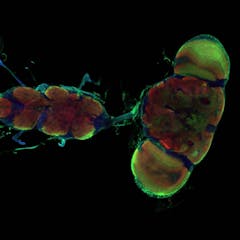
Articles sur Quick reads
Affichage de 461 à 480 de 1014 articles

Researchers consider how friendships that bridge across social class – “cross-class friendships” – contribute to middle school academic achievement differences based on level of parents’ education.

Using the incredible wealth of fossil data and a modern ecological theory, researchers estimated population density for the extinct apex predator.

Even when the economy is strong, these young adults face economic hardship.

During economic downturns, local governments tend to cut spending on libraries, even as the need for their services grows.

Complementarianism became central to evangelical belief in response to the feminist movement of the 1970s when many Christians came to champion women’s equality.

Adaptable neurons are tied to learning and memory but also to neurological disorders. By studying fruit flies, researchers found a mechanism that controls neuroplasticity.

The demand was there.

Half of LGBTQ participants in a recent study experienced discrimination, insults, bullying or abuse while playing, watching or talking about sports.

Not all free college programs are the same. New research finds that eligibility requirements and other features influence outcomes.

Our biggest evolutionary advantages are an ability to walk on two legs and our big brains.

A parent’s or grandparent’s stressful experiences change how their offspring behave. And it turns out that moms’ experiences produce different changes in kids than dads’.

Students who took part in the program scored 8% higher on the state science test than students who received traditional instruction, and demonstrated greater social and emotional learning.

A new study finds egalitarian nations have had fewer COVID-19 deaths than individualistic ones like the US, a new study finds. But women’s leadership may have something to do with their success, too.

Chivalry is not an elite men’s club. Women have always been involved.

The first survey of its kind in 15 years also indicated that the number of couples in which one partner makes decisions about giving for the whole household is rising.

Male rats transfer different hereditary information to their offspring depending on their age.

New research uncovers sizable gaps in how college students from different ethnic backgrounds trust the people in charge of their schools. Could a history of racism be to blame?

A community’s wastewater can predict coronavirus cases that haven’t yet been diagnosed. The quicker that information is known, the better.

Four articles from The Conversation US archive provide context and analysis on the historic legislation.

Growing weed indoors is not an environmentally friendly process. Climate controls create a lot of greenhouse gas emissions, and where the pot is produced has a huge influence on emission levels.
